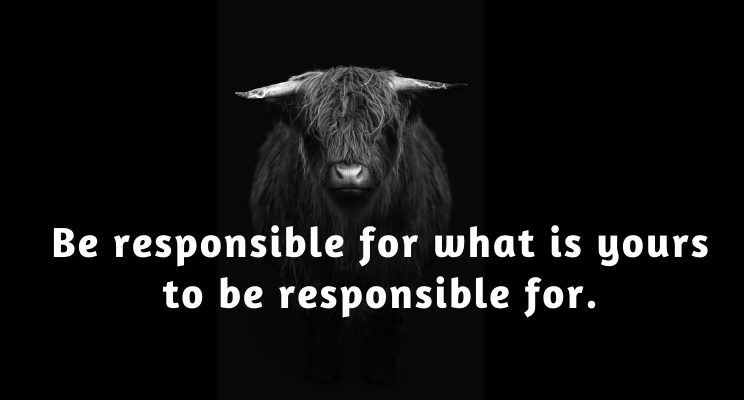Be responsible for what is yours to be responsible for.
There are two parts to this…
The first part is, don’t blame others for something that is your responsibility. Taking responsibility is how you grow your self-confidence and maintain a healthy, positive expectation in your life and future.
On the other hand, taking responsibility and blame are not the same thing. Taking responsibility and owning up our mistakes creates trust. If you’re “perfect” by never admitting to any mistakes, the subconscious reaction from others is that you’re not trustworthy — because nobody is perfect. They’ll sense your insecurity through your cover or think that you must be hiding something.
People respect you for being honest and see you as a strong and confident person. Also, when you own up to your mistakes, you are able to accept the human in others, too. We all need reminders that we are not the only ones who make mistakes. And that our mistakes are not our identity.
Then, there are responsibilities that emerge without your contribution or engagement. Let’s say, for example, that you witness a car driver hitting a pedestrian. It’s your responsibility to be of help right there, right then. If you don’t have first aid skills, you could help by keeping the area clear by not having a crowd recording videos of the accident for their YouTube and Facebook (or be one of them yourself).
The second part is, don’t take other people’s responsibilities on yourself. Instead, help other people to be responsible for what they are responsible for.
If you tend to be that almighty problem-solver who always jumps in and starts to help no matter what it is about and whoever asks your time, attention and advice, next time pause for a moment before doing that.
Other people do need your help — but don’t make it in a way that eternally keeps them dependent on you. Empower others to grow and better themselves, and be the best they can be.
Lastly, there are lazy, irresponsible and abusive people who gladly have you take care of their responsibilities. It’s your responsibility to say “no” — and keep saying “no” — when you realize that you and your willingness and capability to help are taken granted or abused. Which circles back to your responsibilities…
Your personal and business boundaries are YOUR responsibility.
It’s your job to observe, think through and experiment with what kind of boundaries are functional with different people in your life.
Having boundaries and addressing when they are violated is your responsibility and right. Learning to do that leads to a much more balanced and joyful life. For you and the people around you, I promise you that.
FREE ARTICLES, VIDEOS AND RESOURCES
That Help You To Activate Your Transition, Launch Profiting From Your Skills And Accelerate The Growth Of Your Business
Would you like to receive these resources in your inbox, at no charge?
Enter Your Email Address
FREE ARTICLES, VIDEOS AND RESOURCES
That Help You To Activate Your Transition, Launch Profiting From Your Skills And Accelerate The Growth Of Your Business
Would you like to receive these resources in your inbox, at no charge?
Enter Your Email Address


